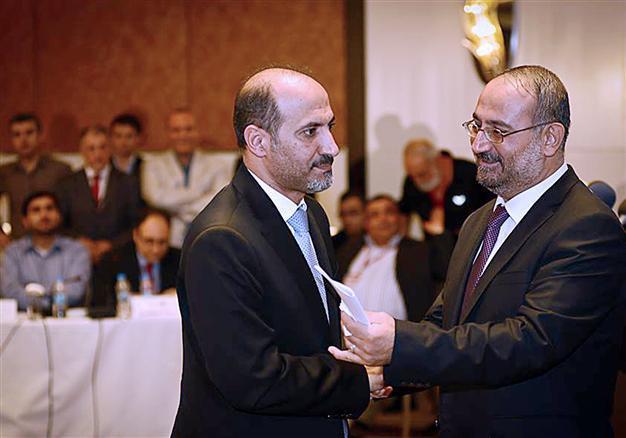Syria opposition urges UN Chapter VII resolution allowing use of force
BEIRUT - Agence France-Presse

Ahmad Tuma (L), Syria's newly elected interim Prime Minister by the Syrian opposition National Coalition (SNC), shakes hand with the chief of SNC, Ahmad Jarba (R) after a press conference on Sept. 17. AFP photo
Syrian opposition chief Ahmad Jarba urged the Security Council Sept. 17 to adopt a resolution under Chapter VII of the U.N. charter allowing use of force to cripple Syria's "war machine".
In a speech on Arab televisions, Jarba said "ending the killing of Syrian people is only possible by stopping the regime's war machine and barring it from using its aviation, missiles and artillery, and depriving it of its chemical weapons."
The head of the opposition National Coalition said this action should be taken "under Chapter VII of the U.N. Charter."
His comments came as envoys from the five Security Council permanent members met at U.N. headquarters in New York to discuss a French-drafted resolution on destroying Syria's chemical weapons.
Diplomats said ambassadors discussed a French text which included a demand for action under Chapter VII of the U.N. Charter if Syrian President Bashar al-Assad does not stick to the US-Russian plan.
Britain, France and the United States are in favour of a strong resolution against Syria.
But Russian Foreign Minister Sergei Lavrov, who agreed a deal on Sept. 14 with U.S. counterpart John Kerry to dismantle and destroy Syria's chemical arms stockpile by mid-2014, is opposed to a resolution that is under the chapter of the U.N. charter that allows the use of force.
France also wants chemical weapons attacks in Syria referred to the International Criminal Court.
Jarba, whose speech was delivered in Istanbul and broadcast by the Dubai-based Al-Arabiya satellite news channel, said a resolution under Chapter VII "paves the way to a solution to the Syrian crisis... that would lead to a democratic regime that will rebuild Syria." He accused the international community of "keeping silent on the crimes of the regime" and charged that this attitude allowed the Damascus regime to unleash chemical attacks.
The United States had threatened a military strike on Syria after declaring that the al-Assad regime launched a chemical attack on Damascus suburbs last month that killed hundreds.
Syria denies any responsibility and has accused rebels fighting to topple Assad of using chemical weapons.
"We don't want to see the al-Assad regime use the hesitation [of the international community] as a green light to resume its odious crimes," said Jarba.
"We don't want to see al-Assad continue to kill hundreds of thousands of Syrians with heavy weapons, with the protection of an agreement allowing him to use all means to kill except chemical weapons."
